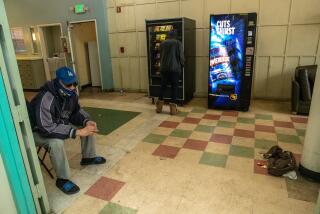Shortfall Left City Looking for Cash to Meet Its Payroll
- Share via
Gardena City Council has overspent in its effort to get a Smith’s Food & Drug Center developed, leaving city officials scrambling on two occasions to find money to pay city employees, City Treasurer Lorenzo F. Ybarra said in a recent letter to the city manager.
“We had to search for money to meet the payroll,” Ybarra said in an interview. “That’s not good management by the City Council or the finance department.”
But City Manager Kenneth W. Landau denied that the city was in financial trouble.
“At no time was the city of Gardena in jeopardy of serious cash flow (problems),” Landau said. “And at no time were the city’s investments in danger either.”
At the center of the argument is the Smith’s project, which Landau has pushed and Ybarra has opposed. The development, which abuts the Gardena Willows wetland, would cover 54,000 square feet at Artesia Boulevard and Vermont Avenue.
In June, 1994, the city purchased the site from Caltrans for $3.7 million and agreed to sell it to Gardena Vidovich Partners for the same price. But the city has fallen behind on paying for the parcel because, Ybarra said, the city lacks sufficient funds. It was either meet the payroll or pay for the site, he said.
Gardena, with a budget of about $40 million for fiscal year 1994-1995, has a payroll of nearly $1.7 million a month.
So far, the city has spent $1.5 million for soil testing on the site, and has set aside $500,000 more for the testing.
But Landau argues that the city has $7 million in investments that are easily liquidated, if the city needs the money to meet its obligations.
On Dec. 22 and Jan. 6, Ybarra said the city had to wait for payments of sales taxes and business licenses before employees’ checks could be issued.
Deputy City Treasurer J. Ingrid Tsukiyama agreed that within the last six months the treasury has had to anticipate incoming funds to meet the payroll. While this is often common business practice, Tsukiyama said that previously funds were more readily available.
“What if the check hadn’t come in? We wouldn’t have been able to meet payroll,” Tsukiyama said. “So far we’ve been lucky.”
City officials expect the city to receive an estimated $250,000 in sales taxes each year after Smith’s opens. Under an agreement with the city, the developer would get a refund of up to $1 million in sales taxes produced by the Smith’s store over the next 15 years.
Landau said these type of payments encourage development and benefit the city. But Ybarra said the city is giving back its operating budget.
“The money could be used to run the city,” Ybarra said. “Instead it’s leaving the city.”
If a problem did arise in meeting payroll, Tsukiyama said, the city would turn to its liquid investments, but the city could make more money on the investments if they are left alone until their maturity dates have been reached.
More to Read
Sign up for Essential California
The most important California stories and recommendations in your inbox every morning.
You may occasionally receive promotional content from the Los Angeles Times.











